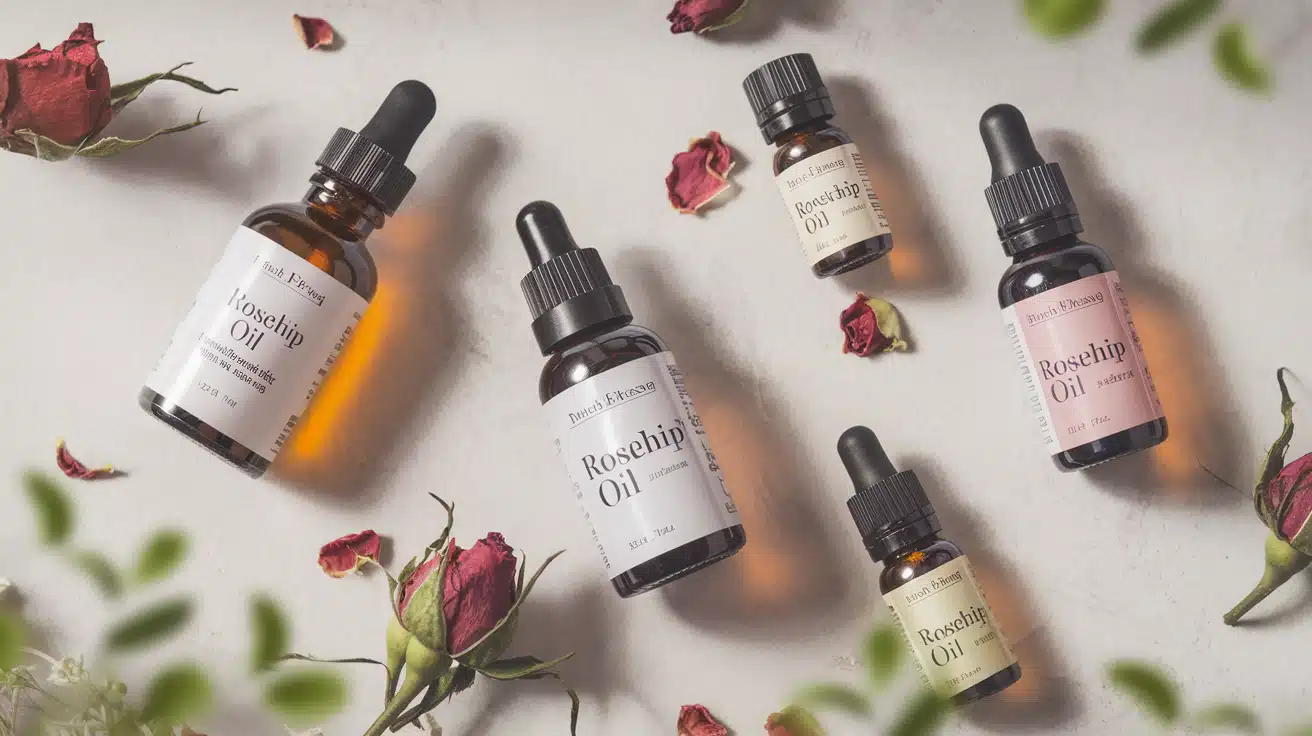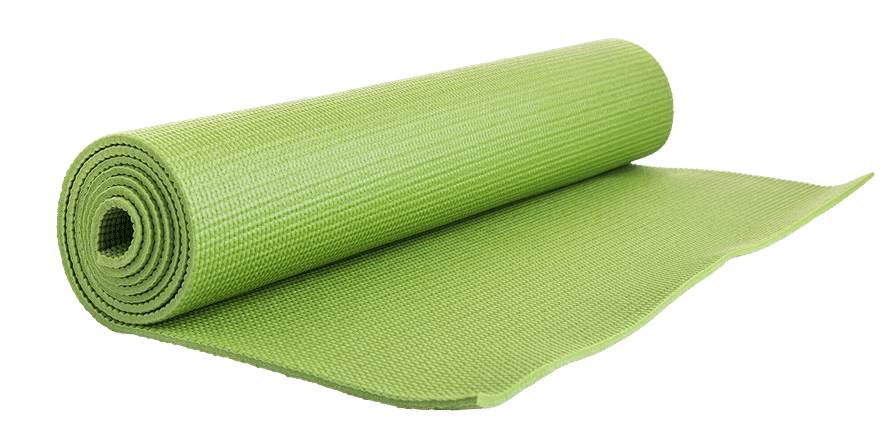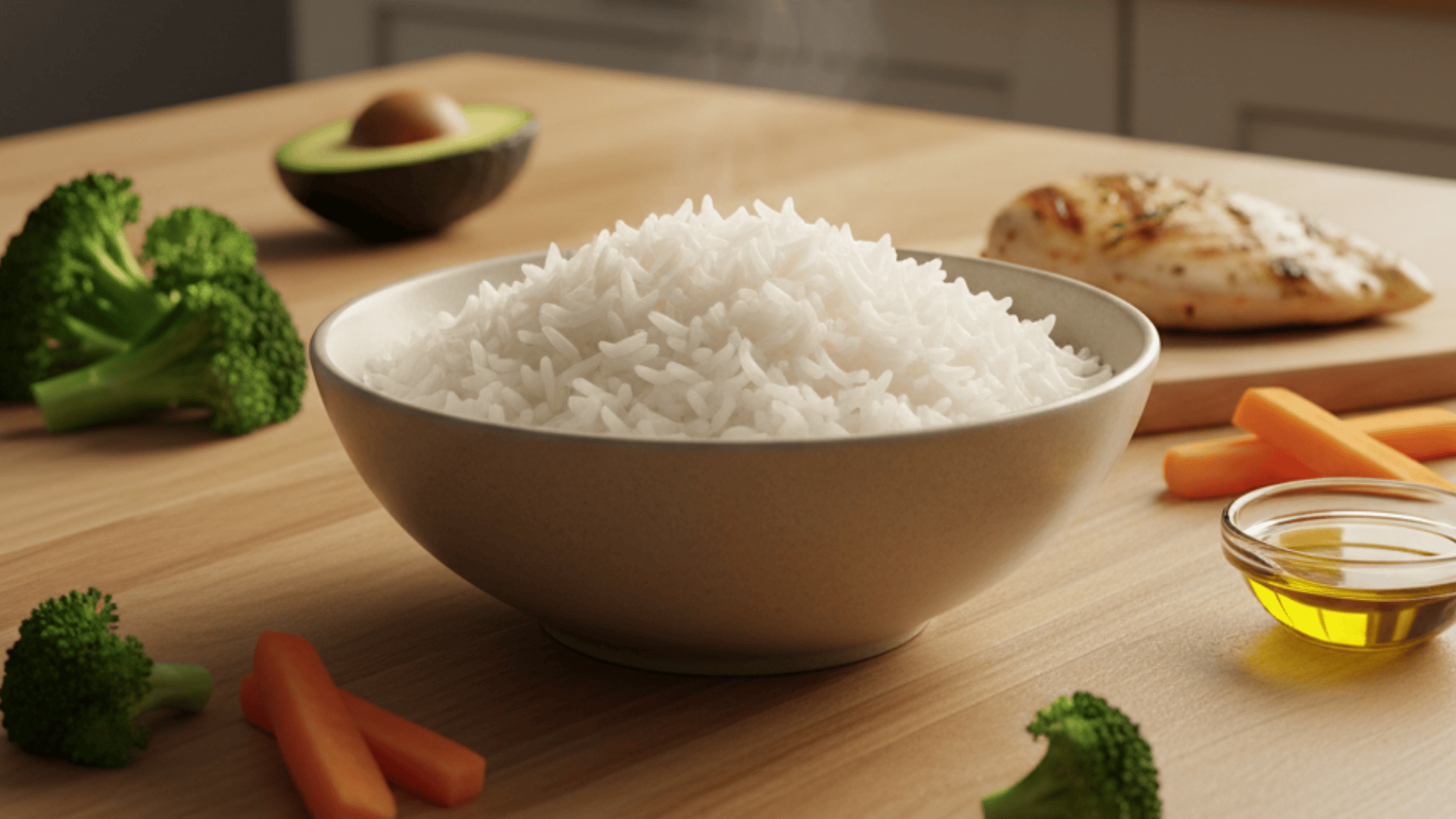Rosehip oil is often considered a must-have in many skincare routines for its ability to help with everything from fine lines to dry skin. But with so many options available, how do you choose the best rosehip oil for your face?
In this blog, I’ll walk you through the top rosehip oils, their unique benefits, and the factors you should consider before making a purchase.
If you’re looking for an affordable option, a highly organic choice, or something to tackle stubborn skin issues, I’ve covered them.
Keep reading to find out which rosehip oil works best for your skin needs and why it could be a great addition to your skincare routine.
What Makes Rosehip Oil Unique?
Rosehip oil stands out for its rich nutrient profile, offering multiple skincare benefits. Its high concentration of vitamins and fatty acids makes it an excellent choice for rejuvenating and hydrating the skin.
Nutrient Breakdown
Vitamins A & C: These vitamins are well-known for their anti-aging properties. Vitamin A promotes skin renewal, while Vitamin C helps brighten the skin, providing a youthful glow and fading dark spots over time.
Omega Fatty Acids: Rich in essential fatty acids, rosehip oil provides deep hydration, balances moisture levels, and helps repair the skin barrier. These acids lock in moisture, preventing dehydration and improving skin elasticity.
Types of Rosehip Oil
Cold-Pressed: This method retains the maximum nutrients from the seeds. It’s the most beneficial type for skincare, as it preserves all the antioxidants and essential fatty acids essential for healthy, glowing skin.
Organic vs. Refined: Organic rosehip oil offers potent benefits since it’s extracted without harmful chemicals, ensuring pure, unadulterated ingredients. Refined oils, while often cheaper, may lose some vital nutrients during processing, making them less effective.
Best Rosehip Oil for Face
Here are the best rosehip oils, selected for their unique qualities, including anti-aging benefits, hydration, and skin rejuvenation, to help you choose the right one for your skin needs.
The Ordinary Cold-Pressed Rosehip Seed Oil
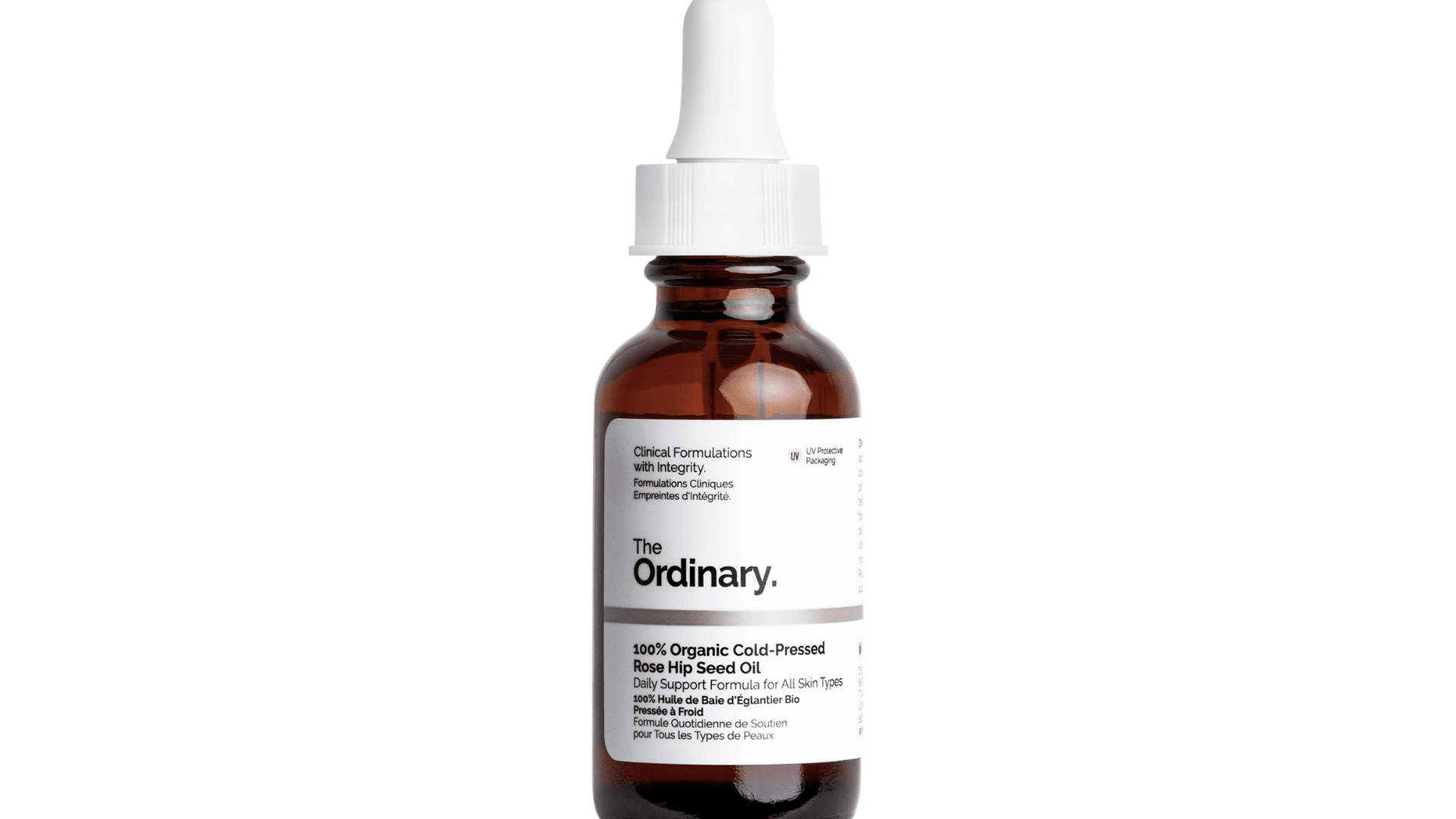
The Ordinary Cold-Pressed Rosehip Seed Oil is an excellent choice for those looking for affordable and effective skincare.
This 100% pure oil is rich in antioxidants and essential fatty acids, making it highly effective for anti-aging and fine line reduction. It’s a cost-effective solution that delivers impressive results with regular use.
The only downside is that it oxidizes quickly after opening, so it should be used up within a few months for maximum effectiveness.
Price: $11 for 1oz
Best for: Anti-aging, fine line reduction
Pros: Affordable, 100% pure, rich in antioxidants
Cons: Limited size options, slight oxidation if not used promptly
PURA D’OR Organic Rosehip Seed Oil
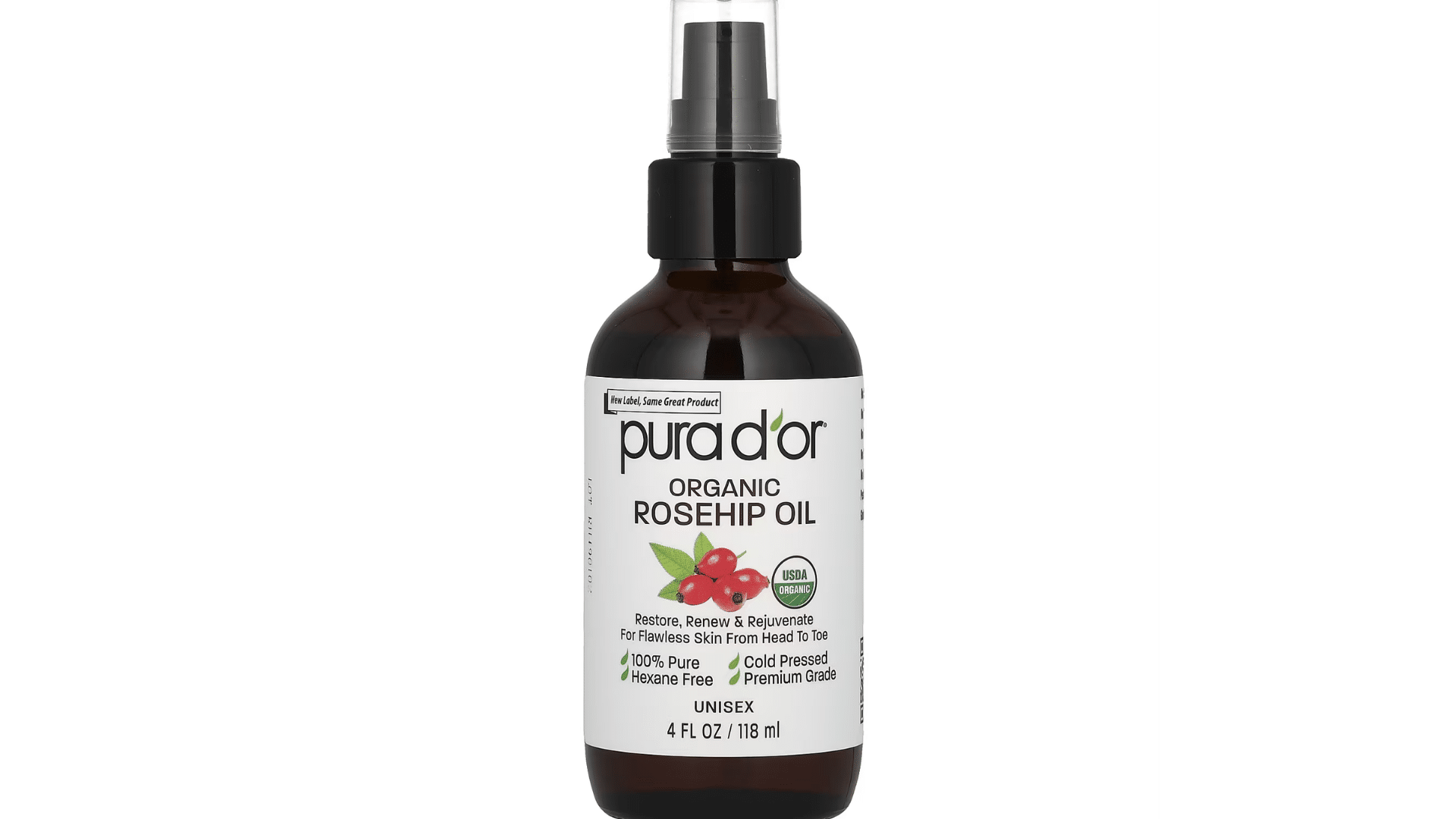
PURA D’OR Organic Rosehip Seed Oil stands out as a budget-friendly option without compromising quality. It comes in a generous 4oz bottle, making it great for users who want to get more for their money.
This USDA-certified organic oil is perfect for all skin types, including sensitive or acne-prone skin, as it’s non-comedogenic. However, its strong earthy smell might not be appealing to everyone, but this is a small price to pay for its numerous benefits.
Price: $11 for 1oz
Best for: Anti-aging, fine line reduction
Pros: Affordable, 100% pure, rich in antioxidants
Cons: Limited size options, slight oxidation if not used promptly
Acure The Essentials Rosehip Oil
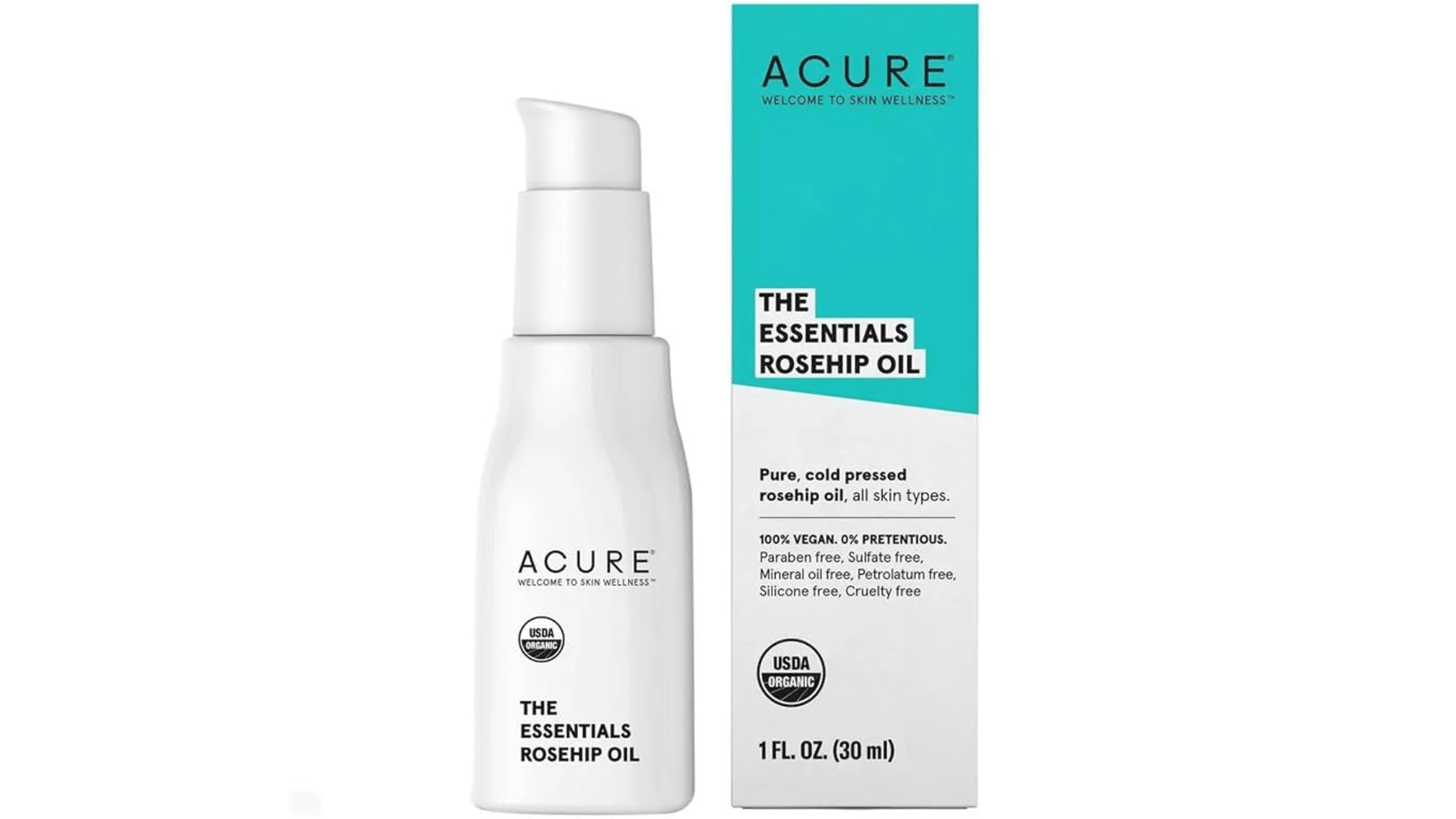
Acure The Essentials Rosehip Oil is a top-tier organic option. This USDA organic oil is lightweight and fast-absorbing, making it perfect for daily moisturizing without leaving any greasy residue.
It’s ideal for anyone who values organic skincare and is looking for a gentle yet effective solution for hydration and skin rejuvenation. Its higher price and small bottle may be drawbacks, but the quality justifies the cost for those seeking natural, clean beauty.
Price: $45 for 1oz
Best for: Daily moisturizing, organic skincare
Pros: USDA organic, lightweight, fast-absorbing
Cons: Small bottle, higher price
Gisou Honey Infused Face Oil
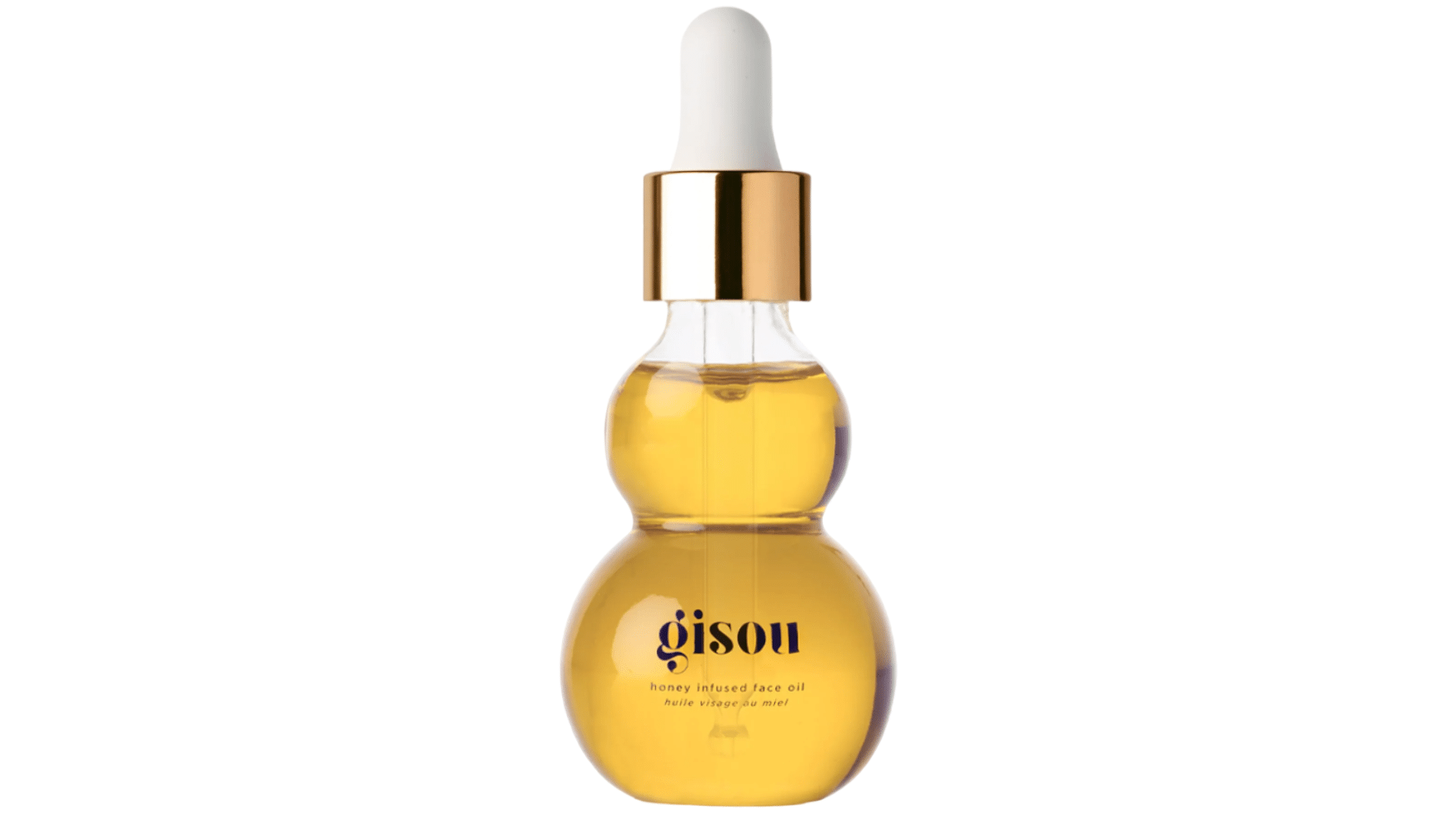
Gisou Honey Infused Face Oil is a luxurious option for those with dry or sensitive skin. This oil combines rosehip with honey and propolis, providing deep hydration while nourishing the skin.
It’s quickly absorbed, leaving the skin feeling soft and moisturized without any greasy residue. While it’s quite pricey, it delivers exceptional hydration and skin-smoothing results. However, it may not be the best option for oily skin due to its rich formulation.
Price: $50 for 1oz
Best for: Dry, sensitive skin
Pros: Deep hydration, quick absorption, nourishing
Cons: Expensive, not ideal for oily skin
Herbivore Phoenix Facial Oil
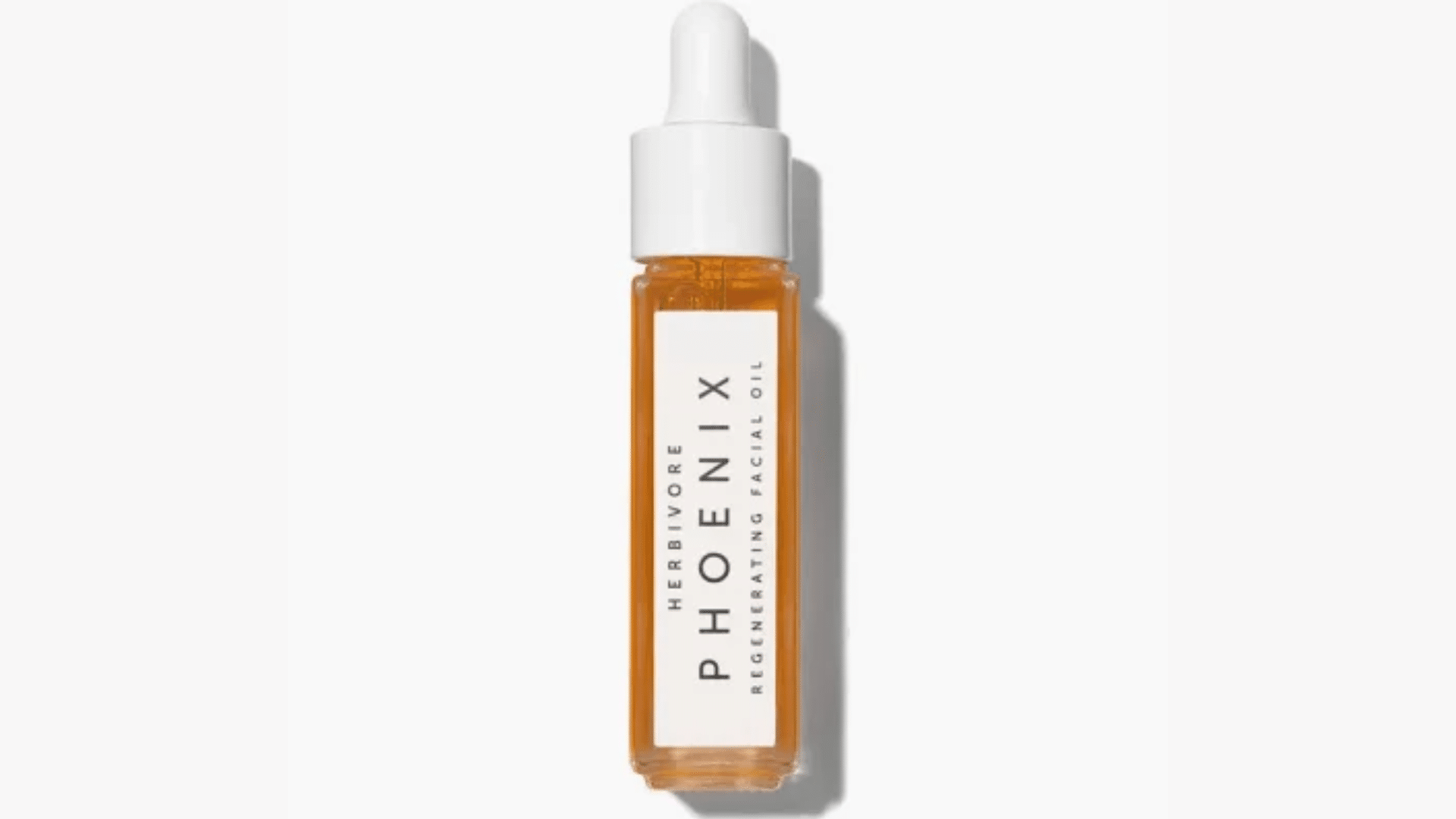
Herbivore Phoenix Facial Oil is a premium facial oil that targets mature skin. It combines rosehip oil with other nourishing ingredients to help stimulate collagen production and calm inflammation.
Its rich formula provides deep hydration while rejuvenating the skin’s texture, making it perfect for those with aging skin. The downside is its price, and some users with fair skin may find it leaves a slightly orange tint.
Still, it’s a splurge worth considering for its rejuvenating benefits.
Price: $88 for 1.7oz
Best for: Mature skin, skin rejuvenation
Pros: Calms inflammation, stimulates collagen
Cons: Pricey, may leave an orange tint on fair skin
How to Use Rosehip Oil for Best Results
To get the most out of your rosehip oil, follow this simple step-by-step guide for optimal skin benefits.
For optimal results, it’s important to incorporate rosehip oil into your evening routine, allowing it to work overnight and rejuvenate your skin. Here’s how to apply it effectively:
- When to Apply: The Evening skincare routine is most effective for nighttime skin renewal.
- How Much to Use: 3-4 drops are enough to cover your face.
- Application: Gently massage into the skin after toning, before applying moisturizer.
Tips for Maximum Effectiveness of Rosehip Oil
Use rosehip oil consistently for the best results. These tips can help enhance your skin’s glow and smoothness:
- Use nightly for continuous improvement: Apply the oil regularly before bed to allow it to nourish and repair your skin overnight.
- Mix with a moisturizer or serum for extra hydration: Enhance your routine by blending the oil with your favorite moisturizer or serum for added moisture.
- Pair with sunscreen during the day for optimal protection from UV damage. Rosehip oil can aid in skin repair, but sunscreen is crucial for protecting your skin from further damage.
Store in a cool, dark place to prevent oxidation. This helps ensure the oil stays fresh and effective by keeping it away from heat and light.
Use consistently for 4-6 weeks for visible results: Consistency is key; you’ll begin to notice significant improvements in texture and scars with continued use.
Environmental Impact & Sustainability of Brands
Sustainability plays a crucial role in choosing the best rosehip oils. Learn about the eco-friendly practices and packaging used by top brands.
Eco-Friendly Practices
Many rosehip oil brands are committed to sustainable sourcing and ethical farming practices. These brands prioritize working with organic farms that respect the environment, using methods that don’t harm the soil or nearby ecosystems.
Brands that promote sustainable farming also ensure that rosehip seeds are harvested without depleting the land, ensuring long-term environmental health. This commitment helps to preserve biodiversity while providing a high-quality product.
Packaging & Sustainability
Eco-conscious brands use recyclable glass bottles instead of plastic, significantly reducing their environmental footprint. Glass packaging not only preserves the integrity of the oil but also promotes reusability and sustainability.
Many brands also opt for minimalist packaging to reduce waste, and some even utilize compostable materials.
Highlighting brands with cruelty-free and organic certifications further reinforces their commitment to a greener, more ethical skincare option.
Alternative Uses for Rosehip Oil Beyond Facial Care
Rosehip oil offers multiple benefits beyond facial care. Find out how it can improve hair, body, and nail health.
Hair Care
Rosehip oil is highly beneficial for hydrating dry hair and reducing frizz. Its essential fatty acids nourish the hair shaft, providing moisture without weighing it down.
Massaging it into your scalp can also help boost circulation, promoting healthier hair growth. For smoother, shinier hair, apply a few drops to damp hair or use it as a leave-in treatment.
Body Care
Rosehip oil is an excellent choice for improving skin texture and fading scars. Its high concentration of vitamins A and C helps to brighten skin and improve elasticity, making it ideal for stretch marks or uneven skin tone.
Applying it to dry areas can also hydrate and repair the skin barrier, leaving your body feeling soft and smooth.
Nail Care
Rosehip oil is effective in strengthening cuticles and nails, helping to prevent breakage. It’s rich in omega fatty acids that nourish and hydrate, ensuring your nails stay healthy and strong.
Gently massaging the oil into your cuticles not only helps with moisturization but can also promote nail growth, keeping them looking neat and healthy.
Comparative Performance Across Different Skin Types
Rosehip oil works differently depending on your skin type. Find the best options for dry, oily, acne-prone, and sensitive skin.
For Dry Skin
Rosehip oil provides deep moisture and locks in hydration, making it ideal for dry skin. Oils like Gisou and Acure are perfect choices.
These oils are rich in essential fatty acids and antioxidants, which hydrate and replenish moisture, leaving skin feeling soft and nourished. They help restore the skin’s barrier, reducing the appearance of dry patches and improving skin texture.
For Oily Skin
For oily skin, look for non-comedogenic rosehip oils that balance oil production without clogging pores. The Ordinary Cold-Pressed Rosehip Seed Oil is a great option.
Its lightweight texture ensures it won’t weigh down the skin or cause breakouts. By providing moisture without excessive greasiness, it helps keep the skin balanced and hydrated, reducing oiliness over time.
For Acne-Prone Skin
Rosehip oil can be beneficial for acne-prone skin as it helps reduce acne and heal scars. Life-Flo and The Ordinary offer oils rich in vitamins A and C that help fade dark spots and reduce inflammation.
These oils are light and easily absorbed, making them effective for scar treatment without clogging pores, promoting clearer, smoother skin over time.
For Sensitive Skin
For sensitive skin, choose oils that are gentle and non-irritating. Life-Flo and Aromatica offer cold-pressed, organic rosehip oils that are mild yet effective.
These oils provide hydration and skin-soothing benefits without causing redness or irritation. They help restore moisture while keeping the skin calm and balanced, perfect for users with reactive skin.
Potential Risks and Side Effects
While rosehip oil offers numerous benefits, it also has some potential risks and side effects. Here’s how to avoid issues when using it.
Allergic Reactions
Before using rosehip oil fully, it’s essential to perform a patch test to ensure you don’t have an allergic reaction.
How to Patch-Test: Apply a small amount of rosehip oil to a discreet area (like behind your ear) and wait 24-48 hours to check for any irritation.
Possible Side Effects
- Irritation
- Breakouts
- Clogged Pores
- Redness
- Itching
- Burning Sensation
Safety Tips
To safely incorporate rosehip oil into your skincare routine and avoid irritation, start with a small amount and gradually build up your usage.
- Start with a small amount: Apply a few drops every other night to assess how your skin reacts.
- Gradual incorporation: Slowly increase the frequency to nightly use if your skin tolerates it well.
- Patch test first: Always do a patch test 24-48 hours before full application to check for allergic reactions.
- Monitor skin reactions: Watch for any signs of irritation, such as redness, itching, or burning. Discontinue use if symptoms appear.
- Avoid mixing with potent actives: Avoid using rosehip oil with other strong active ingredients like retinol or vitamin C on the same day.
- Apply to clean skin: Always apply rosehip oil after cleansing and toning, ensuring it absorbs well without interference from other products.
Who Should Avoid It
While rosehip oil is safe for most skin types, certain individuals should avoid it or consult a dermatologist before use.
Individuals with eczema or dermatitis: Those with certain skin conditions may find rosehip oil too potent for their sensitive skin and should avoid it.
People with active breakouts: If your skin is prone to cystic acne, rosehip oil could exacerbate inflammation.
Conclusion
Now that you’ve learned about the best rosehip oils for facial care, you’re ready to make an informed decision on which one fits your needs.
If you’re aiming for better hydration, reducing fine lines, or addressing skin imperfections, rosehip oil can be an upgrade part of your skincare routine.
Be sure to patch-test first and gradually incorporate it into your evening routine. If you want to reduce scars, smooth your skin, or keep it hydrated, rosehip oil is a natural, effective solution.
Don’t stop here, check out my other blogs for more skincare tips and product recommendations to improve your beauty regimen.
Frequently Asked Questions
What rosehip oil does Kate Middleton use?
Kate Middleton reportedly uses Trilogy Certified Organic Rosehip Oil, known for its purity, effectiveness in anti-aging, and skin rejuvenation. It’s a favorite for achieving radiant, youthful skin.
Is rosehip oil good for the face daily?
Yes, rosehip oil is beneficial for daily use for most skin types, offering moisture, anti-aging, and scar healing. Start gradually, especially for sensitive skin, to assess tolerance before nightly application.
What should not be mixed with rosehip seed oil?
Avoid mixing rosehip oil with strong acids (AHAs, BHAs), retinols, or vitamin C, as they can irritate the skin or reduce effectiveness. Always check product compatibility to prevent irritation.
What is better than rosehip oil for the face?
Argan oil, jojoba oil, and marula oil may suit specific needs better. Argan oil hydrates and balances, jojoba works well for acne-prone skin, while marula offers intense hydration and anti-aging benefits.




